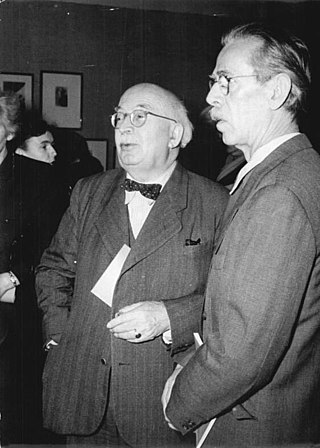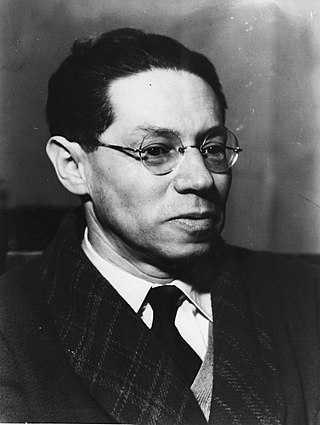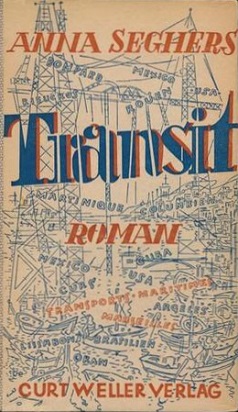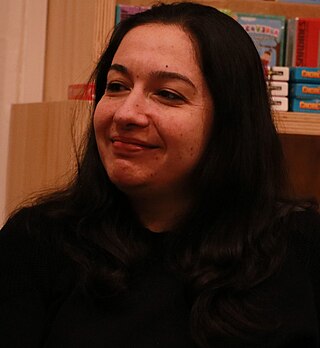
Exile or banishment, is primarily penal expulsion from one's native country, and secondarily expatriation or prolonged absence from one's homeland under either the compulsion of circumstance or the rigors of some high purpose. Usually persons and peoples suffer exile, but sometimes social entities like institutions are forced from their homeland.

Arnold Zweig was a German Jewish writer, pacifist and socialist.

Lion Feuchtwanger was a German Jewish novelist and playwright. A prominent figure in the literary world of Weimar Germany, he influenced contemporaries including playwright Bertolt Brecht.

Helmut Flieg was a German writer, known by his pseudonym Stefan Heym. He lived in the United States and trained at Camp Ritchie, making him one of the Ritchie Boys of World War II. In 1952, he returned to his home to the part of his native Germany which was, from 1949 to 1990, the German Democratic Republic. He published works in English and German at home and abroad, and despite longstanding criticism of the GDR remained a committed socialist. He was awarded the 1953 Heinrich Mann Prize, the 1959 National Prize of East Germany, and the 1993 Jerusalem Prize.

Anna Seghers, is the pseudonym of German writer Anna Reiling, who was notable for exploring and depicting the moral experience of the Second World War. Born into a Jewish family and married to a Hungarian Communist, Seghers escaped Nazi-controlled territory through wartime France. She was granted a visa and gained ship's passage to Mexico, where she lived in Mexico City (1941–47).

Olga Benário Prestes was a German-Brazilian communist militant executed by Nazi Germany.

Cornelia Maria Funke is a German author of children's fiction. Born in Dorsten, North Rhine-Westphalia, she began her career as a social worker before becoming a book illustrator. She began writing novels in the late 1980s and focused primarily on fantasy-oriented stories that depict the lives of children faced with adversity. Funke has since become Germany's "bestselling author for children". Her work has been translated into several languages and, as of 2012, Funke has sold over 20 million copies of her books worldwide.

Hans Hellmut Kirst was a German novelist and the author of 46 books, many of which were translated into English. Kirst is best remembered as the creator of the "Gunner Asch" series which detailed the ongoing struggle of an honest individual to maintain his identity and humanity amidst the criminality and corruption of Nazi Germany.

For the New Intellectual: The Philosophy of Ayn Rand is a 1961 work by the philosopher Ayn Rand. It is her first long non-fiction book. Much of the material consists of excerpts from Rand's novels, supplemented by a long title essay that focuses on the history of philosophy.
Helen Deutsch was an American screenwriter, journalist, and songwriter.
The Seventh Cross is a 1944 American drama film, set in Nazi Germany, starring Spencer Tracy as a prisoner who escaped from a concentration camp. The story chronicles how he interacts with ordinary Germans and gradually sheds his cynical view of humanity.
The Ninth Symphony of the German composer Hans Werner Henze was written in 1997.

Transit is a novel by German writer Anna Seghers, set in Vichy Marseilles after France fell to Nazi Germany. Written in German, it was published in English in 1944, and has also been translated into other languages.
Francis Nenik is a German farmer who writes in his free time. He has published several novels. Current works include XO as well as a collection of short stories with strict alliteration (2013).

The Underground Railroad is a historical fiction novel by American author Colson Whitehead, published by Doubleday in 2016. The alternate history novel tells the story of Cora, a slave in the Antebellum South during the 19th century, who makes a bid for freedom from her Georgia plantation by following the Underground Railroad, which the novel depicts as a rail transport system with safe houses and secret routes. The book was a critical and commercial success, hitting the bestseller lists and winning several literary awards, including the Pulitzer Prize for Fiction, the National Book Award for Fiction, the Arthur C. Clarke Award, and the 2017 Andrew Carnegie Medal for Excellence. A TV miniseries adaptation, written and directed by Barry Jenkins, was released in May 2021.

Maria Leitner was a Hungarian writer and journalist in the German language. She is remembered as a pioneer of "undercover reporting".

Lina Meruane Boza is a Chilean writer and professor. Her work, written in Spanish, has been translated into English, Italian, Portuguese, German, and French. In 2011 she won the Anna Seghers-Preis for the quality of her work, and in 2012 the Sor Juana Inés de la Cruz Prize for her novel Sangre en el ojo.

Fernanda Melchor is a Mexican writer best known for her novel Hurricane Season for which she won the 2019 Anna Seghers Prize and a place on the shortlist for the 2020 International Booker Prize.

The Osthofen concentration camp was an early Nazi concentration camp in Osthofen, close to Worms, Germany. It was established in March 1933 in a former paper factory. The camp was administered by the People's State of Hesse's Political Police, with guards first drawn from SA and SS, later only SS men. The first prisoners were mostly Communists or Social Democrats, but later Jehovah's Witnesses, Seventh-Day Adventists and non-political Jews were also sent to the camp.
Margot Bettauer Dembo was a German-born American translator of fiction and non-fiction. She translated writing from German to English, and is known for her translations of works by Judith Hermann, Robert Gernhardt, Joachim Fest, Ödön von Horvath, Feridun Zaimoglu, and Hermann Kant. Her work won the Helen and Kurt Wolff Translator's Prize and the Goethe-Institut/Berlin Translator's Prize. She translated multiple non-fiction memoirs and historical accounts of World War II, as well as several works of fiction.















